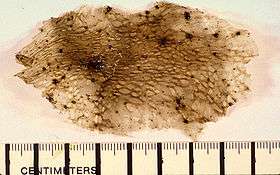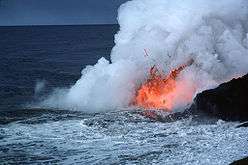Limu o Pele
Limu o Pele or Pele's seaweed (Hawaiian, literally "seaweed of Pele" after Pele the Hawaiian fire goddess of volcanoes) is a geological term for thin sheets and subsequently shattered flakes of brownish-green to near-colorless volcanic glass lava spatter, commonly resembling seaweed in appearance, that have been erupted from a volcano. Limu o Pele is formed when water is forced into and trapped inside lava, as when waves wash over the top of the exposed flows of the molten rock. The water boils and is instantly converted to steam, expanding to form bubbles within the lava. The lava rapidly cools and solidifies as the bubbles grow. The volcanic glass bubbles burst and are dispersed by the wind, showering flakes of glass downwind.

Limu o Pele has been found around subaerial littoral volcanic cones and also at submarine volcanoes, for example, on the summit of Lōʻihi seamount.[1]
See also
References
- Clague, D. A. et al. (2000) Lava bubble-wall fragments formed by submarine hydrovolcanic explosions on Lōʻihi Seamount and Kılauea Volcano, Bulletin of Volcanology, volume 61 pages 437–449.

